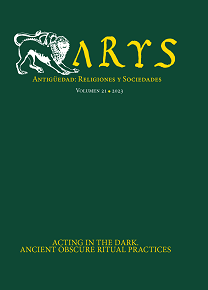Salvo, Irene & Scheer, Tanja S. (eds.) (2021). Religion and Education in the Ancient Greek World. Tübingen: Mohr Siebeck
DOI:
https://doi.org/10.20318/arys.2023.7770Descargas
Referencias
Ambos, Claus, Hotz, Stephan, Schwedler, Gerald & Weinfurter, Stefan (eds.) (2005). Die Welt der Rituale. Von der Antike bis heute. Darmstadt: Wissenschaftliche Buchgesellschaft.
Avramidou, Amalia & Demetriou, Denise (eds.) (2014). Approaching the Ancient Artefact. Representation, Narrative, and Function. A Festschrift in Honour of H. Alan Shapiro. Berlin & Boston: De Gruyter.
Blakely, Sandra (ed.) (2017). Gods, Objects, and Ritual Practice. Atlanta: Lockwood.
Blok, Josine (2017). Citizenship in Classical Athens. Cambridge: Cambridge University Press.
Boivin, Nicole (2008). Material Cultures, Material Minds. The Impact of Things on Human Thought, Society, and Evolution. Cambridge: Cambridge University Press.
Brulé, Pierre (ed.) (2009). La norme en matière religieuse en Grèce ancienne. Liège: Centre international d’étude de la religion grecque antique.
Cole, Susan (1981). Could Greek Women Read and Write. Women’s Studies, 8, pp. 129-155.
Cullhed, Eric (2021). The Dipylon Oinochoē and Ancient Greek Dance Aesthetics. Classical Quarterly, 71.1, pp. 22-33.
Cumont, Franz (1912). Astrology and Religion among the Greeks and Romans. New York & London: G.P.Putnam’s sons.
Cuomo, Serafina (2001). Ancient Mathematics. London & New York: Routledge.
Dillon, Matthew, Eidinow, Esther & Maurizio, Lisa (eds.) (2017). Women’s Ritual Competence in the Greco-Roman Mediterranean. London & New York: Routledge.
Elsner, Jaś (2012). Material Culture and Ritual. State of the Question. In Wescoat & Ousterhout, 2012, pp. 1-26.
Gabrielsen, Vincent (2016). Associations, Modernization, and the Return of the Private Network in Athens. In Tiersch, 2016, pp. 121-162.
Heath, Malcolm (1987). The Poetics of Greek Tragedy. London: Duckworth.
Hübner, Wolfgang (1983). L’astrologie dans l’antiquité, Pallas. Revue d’Etudes Antiques, 30, pp. 1-24.
Ingalls, Wayne (2000). Ritual Performance as Training for Daughters in Archaic Greece. Phoenix, 54, pp. 1-20.
Jennings, Theodore (1982). On Ritual Knowledge. Journal of Religion, 62, pp. 111-127.
Kierstead, James (2018). Women in Associations in Classical and Hellenistic Athens. In Tsakiropoulou-Summers & Kitsi-Mitakou, 2018, pp. 173-187.
Kloppenborg, John & Ascough, Richard (eds.) (2011). Greco-Roman Associations. Texts, Translations, and Commentary. I. Attica, Central Greece, Macedonia, Thrace. Berlin: De Gruyter.
Langner, Martin (2014). Where Should We Place the Krater? An Optimistic Reconstruction of the Vessels’ Visibility during the Symposion. In Avramidou & Demetriou, 2014, pp. 385-398.
Lupack, Susan (2008). The Role of the Religious Sector in the Economy of Late Bronze age Mycenaean Greece. Oxford: Archaeopress.
McGuire, Meredith B. (2008). Lived Religion. Faith and Practice in Everyday Life. Oxford: Oxford University Press.
Perlman, Paula (1989). Acting the She-Bear for Artemis. Arethusa, 22, pp. 111-133.
Sourvinou-Inwood, Christine (1988). Studies in Girls’ Transitions. Aspects of the Arkteia and Age Representation in Attic Iconography. Athens: Kardamitsa.
Stavrianopoulou, Efthymia (2005). Die “gefahrvolle” Bestattungen von Gambreion. In Ambos et al., 2005, pp. 24-37.
Tiersh, Claudia (ed.) (2016). Die Athenische Demokratie im 4. Jahrhundert: Zwischen Modernisierung und Tradition. Stuttgart: Franz Steiner.
Tsakiropoulou-Summers, Tatiana & Kitsi-Mitakou, Katerina (eds.) (2018). Women and the Ideology of Political Exclusion. London: Routledge.
Wescoat, Bonna & Ousterhout, Robert (eds.) (2012). Architecture of the Sacred. Space, Ritual and Experience from Classical Greece to Byzantium. Cambridge: Cambridge University Press.
Descargas
Publicado
Número
Sección
Licencia
Los autores conservan los derechos de autor de sus textos y todos los derechos de publicación sin restricciones.
Los documentos incluyen desde 2021 la licencia Creative Commons 4.0: Atribución–No Comercial–Sin Obra Derivada (CC BY-NC-ND 4.0). Los documentos anteriores incluyen la licencia Creative Commons 3.0: Atribución-No Comercial-Sin Obra Derivada (CC BY-NC-ND 3.0)
